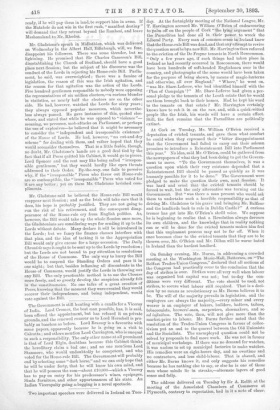On Sunday evening, Mr. Burns, in addressing a crowded meeting
at the Washington Music-Hall, Battersea, on "The Belfast Trades-Union Congress," declared that all sections of the Congress had practically come to the conclusion that the day of strikes is over. Strikes were all very well when labour was organised but capital was not; but to-day the con- ditions were very different. The vote should be used, not strikes, to secure what labour still required. That is a deci- sion by no means as revolutionary as Mr. Burns believes it to be. The will of the majority prevails in legislation, and the employers are always the majority,—every miner and every weaver is an employer of bakers, builders, hatters, tailors, tobacconists, brewers'-men, carpenters, shoemakers, and so ad infinitum. The vote, then, will not give more than the market-price to labour. Mr. Burns further noted that the resolution of the Trades-Union Congress in favour of collec- tivism put an end to the quarrel between the Old Unionists and the Socialists. The unemployed question could not be solved by proposals to find more work. He was not in favour of municipal workshops. If there was no demand for watches, it was useless to set up municipal faetories to make watches. His remedies were an eight-hours day, and no overtime and no contractors, and less child-labour. That is absurd, and either Mr. Burns knows it, and only suggests his remedies because lie has nothing else to say, or else he is one of those men whose minds lie in streaks,—alternate layers of good sense and folly.


































 Previous page
Previous page